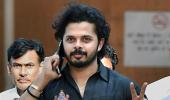'At that time the Delhi police was reeling under various controversies. This case was more of an attention diversion.'
Rakesh Kumar, Ajit Chandila's lawyer, reasons with Manu Shankar/Rediff.com why the Delhi police's case against Shantakumaran Sreesanth, Ankeet Chavan and Chandila in the IPL spot-fixing episode collapsed.
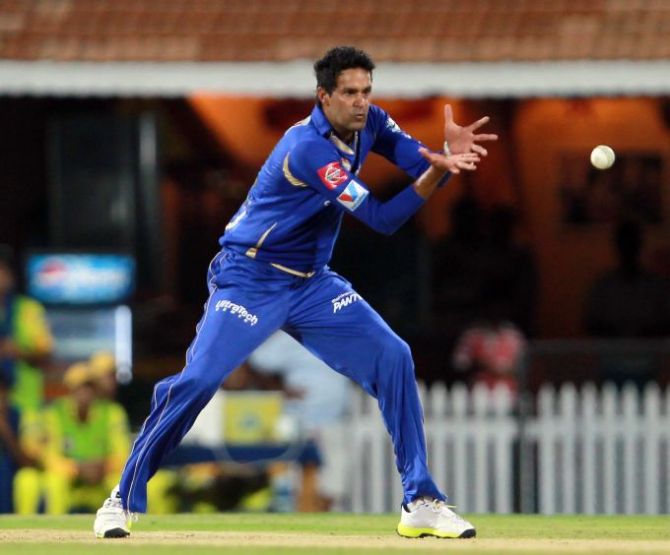
On Saturday, July 25, three cricketers along with 36 others waited at the Patiala House court with bated breath for Additional Sessions Judge Neena Bansal's arrival.
Journalists roamed the corridors of Court Room 27, waiting for the proceedings in the Indian Premier League spot-fixing case to commence.
The wait was rather long after Public Prosecutor Rajeev Mohan requested the court to consider some fresh leads.
It was only at 4:30 pm that Justice Bansal pronounced the verdict Shantakumaran Sreesanth, Ajit Chandila, Ankeet Chavan and the 36 others were waiting to hear.
"All are discharged," she declared in a feeble voice, with a smile on her face.
Sreesanth wept while the respective defence lawyers gave the thumbs up to their clients, who were standing at the back of the courtroom.
The three cricketers were arrested by the Delhi police in May 2013 for allegedly being involved in spot-fixing during matches in the sixth edition of the IPL.
A few days later after the dust has settled on the verdict, Ajit Chandila's lawyer, Rakesh Kumar, met with Manu Shankar/Rediff.com and reasoned why the Delhi police's case fell flat and why the Maharashtra Control of Organised Crime Act, 1999, MCOCA, which the police invoked, never stood a chance against the accused.
What were the reasons for the trial court dismissing the Delhi police's case against the accused?
The Delhi police's main case was under MCOCA. It was totally discarded by the court because it was imposed very loosely, without doing any investigation; even the imposition was not corresponding to the provisions of the MCOCA. So the case has fallen away on the basis of technicalities itself.
I believe the Delhi police has taken a very far-fetched view on this and what I understand from this case, since I have been a part of it since the first day, is the Delhi police deliberately invoked MCOCA.
Secondly, the Delhi police were not able to establish the link as to how this connection was coming down to the players.
So what you are saying is that because Dawood Ibrahim and Chhota Shakeel's names were involved, the Delhi police invoked MCOCA on the cricketers and others accused...
The Delhi police started off their case with the invocation of Section 420 and Section 120B (of the Indian Penal Code), but later on withdrew Section 420 and all of a sudden invoked MCOCA.
When the players and other accused were arrested, at that point of time there were certain arrests made in Mumbai, as well that of Gurunath Meiyappan and Vindoo Dara Singh.
The Mumbai city court granted bail to the two (Meiyappan and Vindoo Dara Singh), so the Delhi police were apprehending that similarly bail would be granted here (against the cricketers) as well. So, in haste, they invoked MCOCA, without going into the nitty-gritty or getting into the technicalities of the same.
Even during the hearing the court asked (the Delhi police) on what grounds was MCOCA invoked and how you are linking it, because MCOCA is for 'organised crime.'
So they (the Delhi police) wanted to prove that Dawood and Chhota Shakeel in Dubai had a cartel working here in India through some links in Pakistan, and from India some people were from Mumbai and Delhi and their ultimate objective was to approach some players who were playing in the IPL and convince them for match-fixing so that they can generate money and that money can be used for the purposes of money laundering as well.
So, even on the face of it, their case falls flat as they couldn't prove any money trail; it was a totally disconnected case.

For the layman who may not understand MCOCA, what are the prerequisites to invoke it?
MCOCA requires certain mandatory requirements and only if you meet the requirements only then can you invoke MCOCA on any individual.
One of the requirements is that there must be continuation of the offence. They had taken the aid of cases against Dawood and Chhota Shakeel in the Mumbai bomb blasts and, subsequently, two, three more cases.
But it was vehemently opposed by the defence counsel and even the court was not satisfied during the arguments. So if two offences had been committed, then the third one should be in continuation; it shouldn't be like some crime was committed 15m, 20 years ago in a totally different field.
Even if one was to accept the prosecution version, then also the case was not falling under MCOCA.
Would you term this as a botched up investigation?
I believe the Delhi police wanted to stay in the media limelight because they knew it (MCOCA) is a very stringent law, and it would take time to adjudicate upon the charges or bail applications.
So in order to remain in the media -- at that time the Delhi police was reeling under various controversies -- this case was more of an attention diversion. This case would have finished much earlier had they not invoked MCOCA.
If they had booked this case under Section 420 and Section 120B, it would not have proceeded further at that stage on June 10, 2013, when bail was granted.
The Delhi police is considering moving a higher court...
See, there are provisions under MCOCA that if the designated person who invokes MCOCA is negligent or has not adopted proper procedure even he may be liable for punishment under MCOCA itself.
There were some arguments made by the other defence lawyers that the investigating officer had not adopted proper procedure prescribed under MCOCA, but no one proceeded on that line, though it was argued.
So if it goes to the high court, it will fall flat there also and they may have to face the consequences, because the judicial authorities will not spare them now. They know now that there is no case.
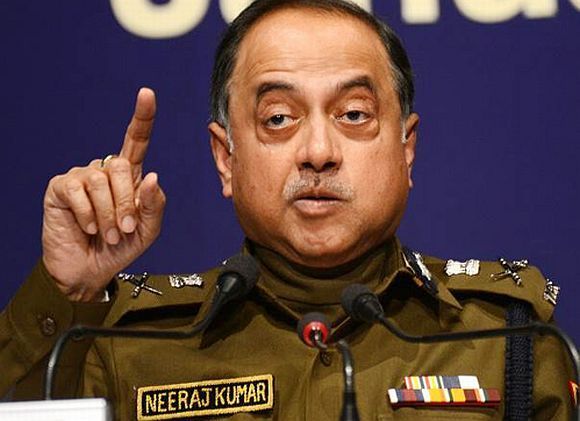
Do you find it strange that the chief investigating officer (then Delhi police commissioner Neeraj Kumar) in this case now heads the Board of Control for Cricket in India's Anti-Corruption Unit?
He should not have been a part of the BCCI Anti-Corruption Unit.
But he has retired as commissioner of police...
Whether he is retired or not... he must be having some notions in his mind. He was one who had taken the decision of the institution of this case.
He was the architect behind the case and the BCCI is a public body.
Not only that, he has ruined the careers of the players; they have suffered so much in these two years and four months.
Is there a law in India against spot-fixing?
First of all, there is no law in India against spot-fixing. There were some recommendations on the same matter, so on that face of it, too, the case weakens.
I mean, when there is no law pertaining to the same how can you punish an individual.
In future, if we were to make spot-fixing a criminal offence, there needs to be an amendment in the IPC (the Indian Penal Code); or if a specific statute comes for it, then it will say that these activities will be punishable offences.
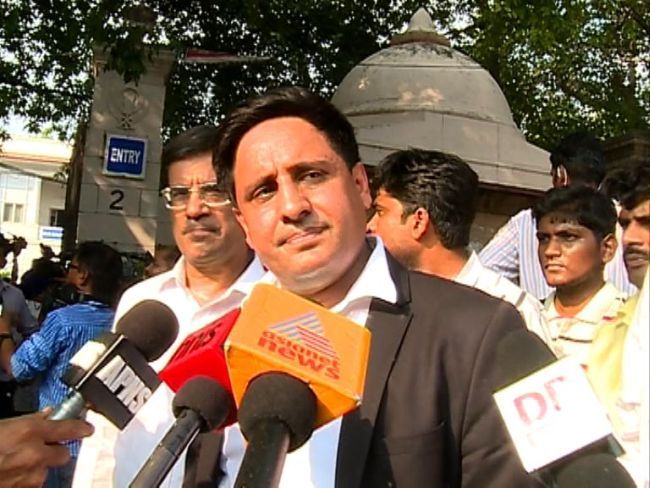
There was an allegation against Chandila that in 2012 he got money for spot-fixing. He did not perform so well, or as expected, in the match and neither did he return the money.
The money that was alleged to be taken by Chandila is basically the version of the prosecution that bookie Sunil Bhatia had made a financial transaction with Chandila. But that was a cheque transaction -- more of a loan transaction and not of IPL match-fixing one.
Those so-called voice samples that the Delhi police claim to have could not be relied upon. The so-called money that was recovered, Rs 20 lakh (Rs 2 million), was from his relative's house.
They had sold off their property and the police threatened the relative by saying they would arrest them as well if they don't give a statement stating that this money was dropped at their place by Ajit.
They are villagers and farmers who had sold off their land and the police threatened them to give the statement. Besides, there was pressure on the police to show the recovery of money and all of a sudden the money showed up.
So you allege that the Delhi police framed Chandila and others...
Yes, to prove their case under MCOCA and for spot-fixing as well, which they say was the resulting activity.
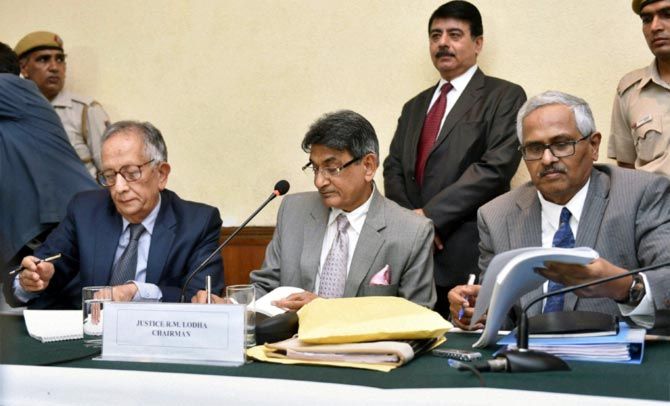
What impact will it have on the Justice Lodha committee's findings?
The Lodha Commission has not examined the involvement of the players directly. They were concerned with the team owners and middlemen.
The Lodha committee's findings have no bearing on this case. The case of these players have no bearing upon the proceedings of the Lodha committee.
It was referred by the Supreme Court to investigate the allegations against specific people or parties (the Chennai Super Kings, Rajasthan Royals, Meiyappan and Raj Kundra). This (case)does not come under the purview of the Lodha committee.
The BCCI conducted its own probe into the IPL spot-fixing episode. It was headed by Ravi Sawani.
The Ravi Sawani proceedings were based on the Delhi police charge-sheet, which has now fallen flat. It was not an independent probe.
How would you term the BCCI probe?
I can comment on the procedures -- whether it was legal or illegal. And I would say it was illegal!
If you remember, the BCCI had taken disciplinary action against Sreesanth and Ankeet Chavan. They couldn't take similar action against Ajit as he was behind bars.
When he came out (of jail) he was summoned by Sawani.
At that time we had taken an objection that since criminal proceedings are parallelly going on, you cannot even ask the questions as it would be violation of Article 20 of the Constitution of India.
Besides, the opportunity (to sit with their attorneys) was not also provided. I was sitting in the lobby and he (Chandila) was in the room with Sawani.
What I came to know was Sawani apparently told Ajit that 'You say certain things and we will save your career.'
Also, bear in mind when Sawani was conducting his investigation, all the three (Sreesanth, Chavan, Chandila) had already undergone a lot. They were not in a proper state of mind after the mental trauma. They could have been represented through their lawyers.
